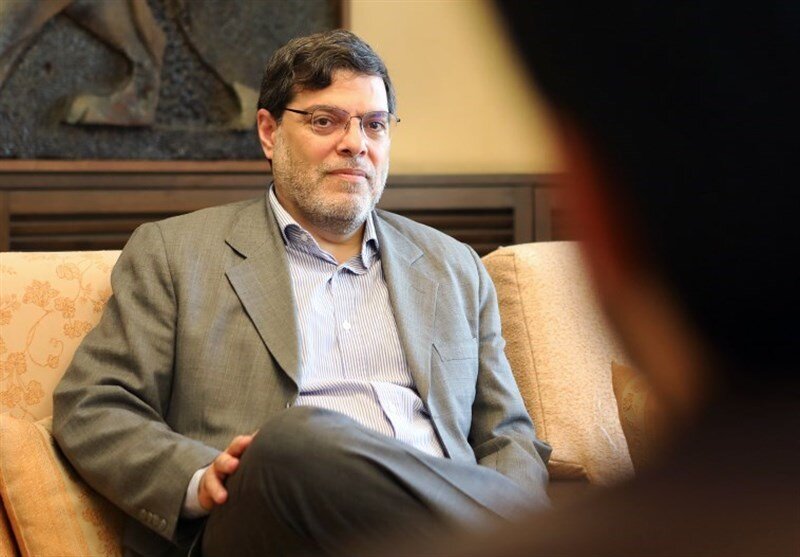Iran distrusts U.S., E3: advisor

TEHRAN - An advisor to the Iranian negotiating team has stated that Tehran wants a revived nuclear agreement that would secure its interests, but the experience of the 2015 nuclear deal shows that Western states are untrustworthy, and any delay in restoring the nuclear agreement will exacerbate European countries' problems.
Speaking on Saturday night, Mohammad Marandi referred to the U.S. and the three European countries still signatory to the nuclear deal as "untrustworthy" and asserted that Tehran seeks an arrangement that will best serve its own interests.
He emphasized that the three European nations—the UK, France, and Germany—obediently follow the policies of whoever occupies the White House and said that Iran was not the party that withdrew from the 2015 agreement, formally known as the Joint Comprehensive Plan of Action (JCPOA).
The senior expert continued by saying that Iran is aware that any potential agreement will fall through until the Western nations stop making unfounded charges against Tehran.
Marandi emphasized that Iran seeks to strike a deal that would guarantee its rights while pointing out that the European troika and Washington are aware of the civilian nature of the Iranian nuclear program.
The three European countries are all partners of the United States, he added, so "we cannot trust the Americans and Europeans. They are not impartial and therefore we shouldn't let their propaganda trick us."
Rafael Grossi, the IAEA director general, was also targeted by Marandi, who said that he "sides with Europeans and Americans, and is servile to them."
The adviser also mentioned that a European official had previously stated that although Iran's requests are legitimate, "the Americans are the ones who are prolonging and stalling" the negotiations during the JCPOA revival talks in Vienna, Austria.
In a press release on Saturday, the UK, France, and Germany, known as E3, expressed serious concerns about Iran's intentions and commitment to a successful conclusion of the JCPOA. They claimed that Tehran's stance conflicts with its legally binding obligations and jeopardizes the chances of reviving the nuclear agreement.
The trio stated that they, along with the other signatories to the agreement and the United States, had "negotiated with Iran, in good faith, since April 2021, to restore and fully execute" the JCPOA.
Iran responded by declaring that the troika's statement was unhelpful and a betrayal of goodwill.
Instead of reversing the diplomatic trend, Iranian Foreign Ministry spokesman Nasser Kanaani recommended London, Paris, and Berlin to take a more active role in addressing the few outstanding concerns in the nuclear negotiations.
He cautioned the E3 to avoid being swayed by outside forces that have opposed talks from the outset and have worked to bring them to a stalemate.
The spokesperson said, “It is regrettable that the three European countries have, by making this ill-considered statement, taken a step in the same direction by the Zionist regime to destroy the negotiations. The E3 should take responsibility for the consequences if they continue to take such a stance.”
The joint statement was seen by experts as an irresponsible move. “Listening to E3 one would think E3 is the aggrieved party who lost over $300b - and 1000s of lives - over the past 3 years because Iran withdrew from JCPOA, reneged on all its obligations and subsequently breached all 11 commitments it made on redressing the situation!” Reza Nasri, an Iran expert, quipped on Twitter.
Tehran believes that Washington would lose Tehran's trust as long as Biden upholds the unwise course of maximum pressure and sanctions against Iran that his predecessor Donald Trump had established. Iranian authorities assert that the Biden administration has only made empty pledges to ease sanctions on Tehran so far. They have criticized the U.S. addiction to sanctions and Biden for carrying on his predecessor's Iran policy.
Since April of last year, Tehran and the other five remaining signatories to the nuclear deal and the U.S. have held many rounds of talks to revive the JCPOA after Trump unilaterally rescinded it in May 2018.
Iran has not held direct talks with the United States. The European Union has acted as an intermediary between the two sides. Iran has announced it will not negotiate directly with the U.S. until Washington returns to the deal.
As part of his "maximum pressure" campaign against Iran, Trump canceled the agreement and reinstated sanctions against the country and added new ones. Even though the Biden administration has frequently admitted that the program has been a mistake and a failure, the sanctions are still in place.
Iranian officials highlight that the ball is in the U.S. court, and the Biden administration should reassure Tehran that it won't make the same mistakes that Trump did.
Washington has come under fire from diplomats for making unreasonable demands from Tehran during the nuclear negotiations and obstructing efforts to restore the JCPOA.
Officials in Tehran have underscored Tehran's desire for a solid and long-lasting agreement and reiterated that the U.S. should lift sanctions against Iran while also assuring Tehran that it won't make the same mistakes in the future.
Despite significant progress, according to Iranian officials, there are still unresolved concerns that must be addressed before a final agreement can be reached. They caution that should Washington fail to make a political choice to restore the 2015 agreement, Tehran has its own "Plan B".
Leave a Comment